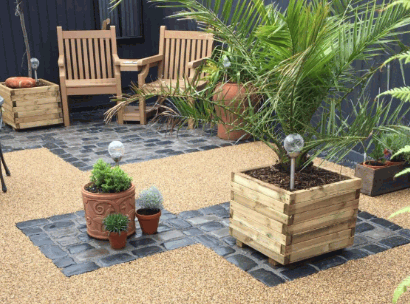Resin patios are an innovative and stylish outdoor option that combines durability with aesthetic appeal.
We explore what resin patios are, their numerous benefits, and how they compare to traditional materials like concrete, pavers, and wood.
The discussion includes costs involved, potential hidden fees, and whether resin patios can fit into your budget, even with a DIY approach.
Discover if a resin patio is the perfect addition to your outdoor space!
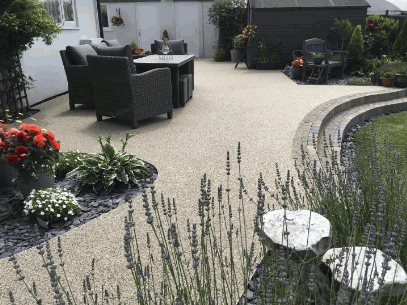
What Are Resin Patios?
Resin patios are a modern outdoor surface option that combines beauty and functionality, offering a durable smooth surface ideal for various applications. They are made from a blend of resin and aggregates, resulting in a permeable surface that allows for efficient drainage, making them particularly popular in the UK for both residential and commercial properties.
These patios can be customised with different aggregate sizes and colours, enhancing their aesthetic appeal while ensuring longevity and low maintenance requirements. Additionally, the installation area layout can be designed to meet unique project considerations, providing homeowners with a tailored solution for their outdoor spaces.
Explore further: How To Lay Resin Patio
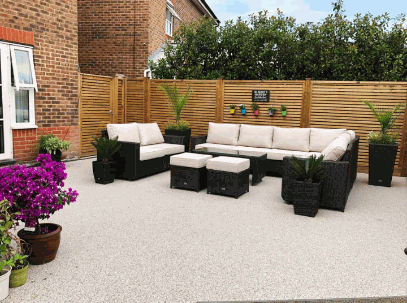
What Are The Benefits Of Resin Patios?
Resin patios offer a variety of benefits that make them a preferred choice for homeowners seeking an outdoor solution that is both beautiful and functional. One of the primary advantages is their low maintenance requirement, which ensures that these durable surfaces remain attractive and easy to care for over time.
In addition, the versatility of resin materials allows for a wide range of design options, enabling homeowners to create patios that suit their personal style and landscaping requirements. Furthermore, resin patios are environmentally friendly, often made from recycled materials, contributing positively to sustainability practices.
Low Maintenance
One of the standout features of resin patios is their low maintenance requirements, making them an ideal choice for busy homeowners or property managers who want to spend more time enjoying their outdoor spaces rather than working on upkeep.
In terms of cleaning, these surfaces are remarkably straightforward. A simple wash with warm soapy water and a soft brush is usually sufficient to keep them looking pristine.
Due to their non-porous nature, they resist staining and do not harbour mould or mildew, which are common issues in more traditional materials like concrete or wood.
In terms of surface repair, resin patios can often be restored with minimal effort. Small scratches or damages can be easily filled in with matching resin, allowing for a seamless look that doesn’t require extensive labour.
This is a significant advantage over conventional patios that may need complete replacements for minor damages.
Longevity is another appealing aspect; resin patios tend to last significantly longer than traditional patio surfaces, making them a sound investment for anyone looking to enhance their outdoor area.
The combination of easy maintenance, straightforward repairs, and extended durability truly sets resin patios apart.
Durable
Resin patios are renowned for their durability, allowing them to withstand heavy foot traffic, harsh weather conditions, and other environmental factors, making them a long-lasting option for outdoor spaces.
This remarkable resilience primarily stems from the quality of materials used in their construction. Often, high-performance UV stable resin is employed, offering superior protection against sun damage, which is crucial for outdoor applications. Unlike non-UV stable alternatives, this material helps to prevent fading and deterioration over time.
- UV Stable Resin: Provides enhanced longevity and maintains aesthetic appeal.
- Non-UV Stable Resin: Prone to discolouration and degradation, leading to a shorter lifespan.
By selecting resin patios made with UV-stable resin, homeowners can ensure that their outdoor spaces maintain both beauty and integrity, combating the detrimental effects of sunlight and climatic extremes.
Therefore, embracing these advanced materials is essential for anyone looking to invest in a durable outdoor solution.
Versatile Design Options
One of the most appealing aspects of resin patios is the versatile design options they provide, allowing homeowners to create unique and visually striking outdoor spaces, filled with vibrant colours and intricate patterns that can elevate any property.
When considering a resin patio, aggregate selection plays a crucial role, influencing not only the texture but also the overall aesthetic of the area. Homeowners have the freedom to choose from a variety of aggregates such as quartz, marble, or even recycled glass, each offering distinct visual characteristics that can transform the mundane into magnificent.
- Plus aggregate types, the complexity of design is limitless.
- From simple, solid colours to elaborate multi-coloured designs that mimic natural stone, the options are endless.
- Customisation options allow for personalised layouts and artistic flair, ensuring that each patio complements the existing architecture and landscape.
This level of personalisation not only enhances the visual appeal but also creates a unique outdoor oasis tailored to individual tastes.
Environmentally Friendly
Resin patios are becoming increasingly recognised as an eco-friendly option for outdoor surfaces, largely due to their materials and permeability.
These innovative surfaces not only utilise recycled materials in their composition but also play a crucial role in enhancing local ecosystems by allowing rainwater to penetrate the ground. This permeability helps mitigate urban flooding and supports the effectiveness of urban drainage systems, a critical aspect in today’s climate-conscious world.
Resin patios comply with Sustainable Urban Drainage Systems (SUDS) guidelines, ensuring reduced runoff and replenished aquifers.
- Utilisation of recycled aggregates to minimise landfill waste
- Improved water absorption reduces surface water pooling
- A low carbon footprint contributes to overall sustainability
By integrating these patios into urban environments, communities can embrace a more sustainable way of living while enhancing the aesthetic appeal of their outdoor spaces.
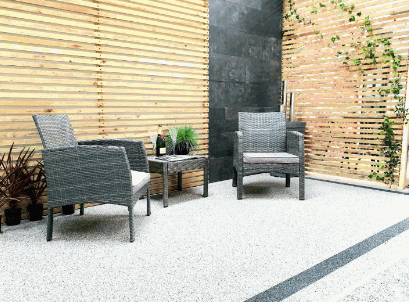
How Much Do Resin Patios Cost?
Understanding the costs associated with resin patios is essential for homeowners considering this investment, as various factors can influence the overall cost per square metre.
Factors Affecting Cost
Several factors can affect the overall cost of resin patios, including geographical location, materials chosen, and the complexity of the installation process.
When considering the cost of a resin patio, one must recognise that geographical location plays a pivotal role. Different regions have variable labour costs, due in part to local market demand and the availability of skilled contractors. For instance, urban areas typically see higher prices compared to rural settings due to the increased cost of living.
Another essential aspect is the complexity of the installation; a straightforward setup may cost less, while intricate designs or sloped surfaces require more labour and time, significantly impacting the final bill. Factors such as:
- Local regulations and permits
- Transport costs for materials
- Environmental conditions influencing installation techniques
can further alter pricing. Therefore, prospective buyers should conduct thorough research and obtain multiple quotes to understand the full scope of costs involved in their project.
Average Cost For Resin Patios
The average cost for resin patios can vary significantly, but homeowners can expect a general range when budgeting for this enhancement.
When planning for a resin patio installation, it’s important to recognise that various factors influence the overall expense. Costs typically fall between £60 and £100 per square metre, depending on the type of resin used and the complexity of the installation.
It’s essential to account for possible fixed costs, such as labour fees—often around £300 to £500—traffic management if required, and any necessary excavation or preparation of the site.
- Basic Installation: £60-£75/sq m
- High-End Options: £75-£100/sq m
- Labour Costs: £300-£500
Being informed about these expenses can help homeowners make well-rounded decisions as they enhance their outdoor spaces.
Additional Costs To Consider
Plus the basic costs, homeowners should be aware of additional costs associated with resin patios, including materials, labour, and the layout of the installation area.
These extra expenses can quickly add up, often surprising those who are unaware of the finer details involved in the installation process.
- Surface repair may be necessary if the existing ground shows signs of wear or damage, potentially increasing the initial investment.
- Cleaning is another consideration, especially if the area has accumulated debris or stains, which can influence the final appearance of the patio.
- Edge restraint is crucial to maintain the integrity of the patio and prevent movement, and this will require additional materials and labour costs.
Therefore, when planning for this upgrade, it is essential to factor in these potential costs to ensure a smooth installation without unexpected financial strains.
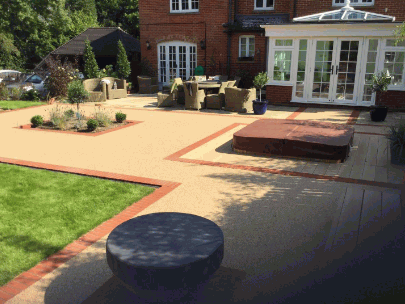
How Do Resin Patios Compare To Other Patio Materials?
When considering patio options, many homeowners often find themselves comparing resin patios to more traditional materials such as concrete, block paving, and tarmacadam.
Resin Vs. Concrete Patios
Resin patios provide a distinct alternative to concrete patios, particularly in terms of maintenance and durability.
When comparing these two options, it is essential to consider several factors that influence long-term satisfaction.
The maintenance requirements for resin are generally lower than those of concrete, where sealants and frequent cleaning may be necessary to prevent staining and degradation over time. In contrast, resin surfaces require occasional resealing but are less prone to cracking, ensuring they maintain their integrity for longer.
- Durability: Resin is flexible and can adapt to changes in temperature and ground movement, whereas concrete can suffer from cracks and chips under such conditions.
- Aesthetic appeal: From an aesthetic standpoint, resin patios can mimic a variety of natural materials, offering a softer and more vibrant look compared to the often rigid and cold appearance of concrete.
Ultimately, individuals looking to enhance their outdoor spaces will find that the choice between these two patio types hinges on personal preference, desired aesthetics, and the specific maintenance they are willing to undertake.
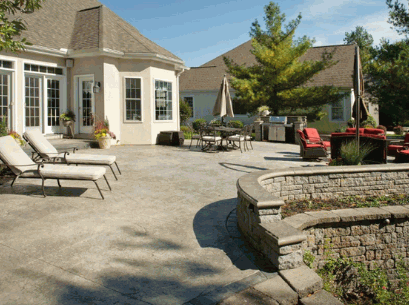
Resin Vs. Paver Patios
Both resin patios and paver patios offer unique advantages, but they differ significantly in design options and environmental impact.
When choosing between these two patio styles, it is essential to consider various factors that may influence your decision.
Resin patios are highly regarded for their exceptional design flexibility, allowing homeowners to create custom patterns and colours that seamlessly connect with their outdoor aesthetics. In contrast, paver patios provide a classic, timeless look through a vast selection of shapes and materials, offering plenty of charm.
From an ecological perspective, resin patios can often be seen as a more sustainable choice due to their permeable nature, which helps with water drainage and reduces run-off. On the other hand, paver patios can be constructed using eco-friendly materials, although their overall carbon footprint may vary based on the type of stone selected and the installation process.
Installation complexities can differ significantly between the two, as resin patios typically require skillful application to ensure a smooth finish, while paver patios, although more labour-intensive initially, can be installed more readily by skilled DIY enthusiasts.
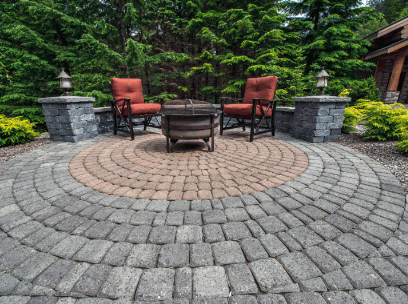
Resin Vs. Wood Patios
When comparing resin patios to timber patios, longevity and maintenance requirements are two critical aspects that stand out.
Plus these factors, the overall aesthetic appeal also plays a significant role in the decision-making process for homeowners.
- Resin patios offer a sleek, modern look and come in various colours and textures, allowing for customised designs that can complement any outdoor space.
- On the other hand, timber patios provide a classic, warm appearance that many individuals find inviting and natural, though they may require regular staining and sealing to maintain their beauty.
The environmental impact of both materials should be taken into consideration, as resin may not be as sustainable as responsibly sourced timber.
Ultimately, it is essential to weigh the benefits against drawbacks, considering factors like cost, longevity, and individual styling preferences, to determine the best choice for a patio that meets both functional and aesthetic needs.
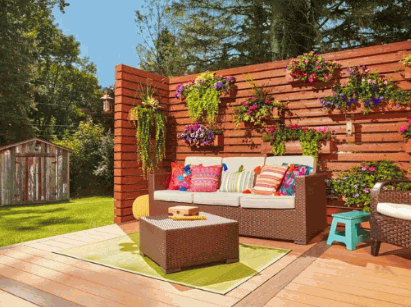
Can Resin Patios Be A Budget-Friendly Option?
Resin patios can indeed be a cost-effective option for homeowners, especially when considering DIY projects or using recycled materials.
DIY Resin Patios
Embarking on a DIY resin patio project can lead to significant cost savings, with homeowners taking full control of the installation process.
This journey not only allows individuals to customise their outdoor space according to personal tastes but also gives them the power to them to manage expenses meticulously.
Before beginning, consider necessary materials, such as resin, aggregate, and tools, which may incur initial costs but ultimately can result in lower overall expenditure compared to hiring professionals. Proper planning can enhance efficiency.
- Choose the right type of resin that suits your climate and desired finish.
- Measure your patio area accurately to avoid excess material waste.
- Prepare the surface thoroughly, ensuring it is clean and level.
Ultimately, taking on such a project not only fosters a sense of achievement but also adds value to the property, making the effort worthwhile.
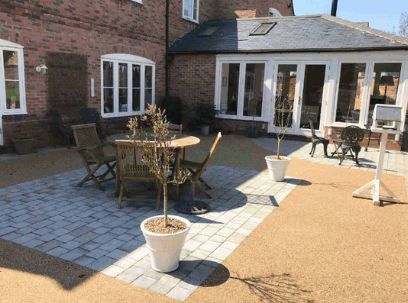
Using Recycled Materials
Utilising recycled materials in the construction of resin patios not only contributes to an eco-friendly approach but can also reduce overall costs.
When considering your options, embracing recycled components can lead you to sustainability without breaking the bank. For instance, using recycled glass chips can create a stunning aesthetic while ensuring durability.
Similarly, repurposing:
- plastic waste
- old rubber tyres
- wood scraps
can all result in cost-effective and innovative patio solutions. Not only do these materials alleviate the burden on landfills, but they also enable homeowners to invest their savings back into other areas of their projects. The dual benefit of budgeting wisely while taking care of the planet serves as a compelling reason to explore recycled alternatives in outdoor construction.
Negotiating With Contractors
Negotiating with contractors can play a crucial role in ensuring that resin patios remain a cost-effective choice for homeowners.
By engaging in thoughtful discussions and strategically assessing bids, individuals can secure a better deal while ensuring quality workmanship. It is essential to understand the scope of the work and gather multiple estimates to foster a competitive bidding environment. Start by requesting itemised quotes that outline costs for materials, labour, and timelines. This transparency helps in identifying areas where adjustments can be made.
- Be clear about your budget to encourage contractors to propose feasible options.
- Consider timing; scheduling installations during off-peak seasons may lead to further savings.
- Establishing a rapport can often lead to added benefits, such as enhanced service or even discounts.
Ultimately, the goal is to ensure both parties feel satisfied with the agreement while maintaining financial prudence.
Are There Any Hidden Costs With Resin Patios?
While resin patios are an appealing option, homeowners should be aware of potential hidden costs that may arise during installation and maintenance.
